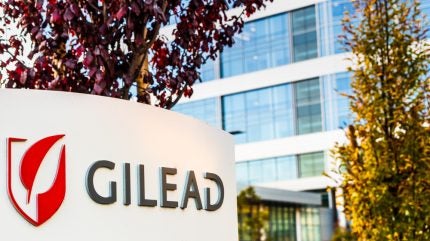
Fresh off a regulatory victory for a new HIV product, Gilead is shifting focus to the oncology space – signing a deal worth up to $750m to license a solid tumour treatment candidate from Kymera Therapeutics.
The deal sees Gilead agree to an exclusive option and licence deal for US-based Kymera’s molecular glue degrader (MGD) programme.

Discover B2B Marketing That Performs
Combine business intelligence and editorial excellence to reach engaged professionals across 36 leading media platforms.
The transaction is weighted towards milestone payments, with Kymera set to receive $85m upfront. The remainder will depend on option exercise payments, along with tiered royalties on sales from any approved products borne from programmes in the future.
MGDs class drugs that act as molecular adhesives, enabling targeted degradation of a protein. Kymera’s drugs are designed to selectively eliminate cyclin-dependent kinase 2 (CDK2) proteins.
CDK2 play a key role in tumour growth, with its dysregulation in cancer leading to uncontrolled cell proliferation via cell cycle progression. The protein is a promising target for cancer therapies in development. AstraZeneca, Pfizer, and Incyte all have candidates in trials that inhibit CDK2.
Kymera believes that eliminating, rather than inhibiting, the protein from cells via its MGD drugs could lead to more precise, safe and effective treatments for cancers. The biotech suggests this approach gives its assets an edge over traditional CDK2 inhibitors.

US Tariffs are shifting - will you react or anticipate?
Don’t let policy changes catch you off guard. Stay proactive with real-time data and expert analysis.
By GlobalDataGilead and Kymera stated that the CDK2 programme has broad oncology treatment potential, specifically highlighting breast cancer and other solid tumours.
However, the company is not alone in the CDK2 adhesive field – Monte Rosa Therapeutics reported mixed clinical results for two of its MGD candidates in March 2025.
Kymera’s CEO Nello Mainolfi said: “Our highly specific, orally active, CDK2 molecular glue degraders have demonstrated a compelling preclinical profile and have the potential to transform the therapeutic landscape for breast cancer patients and other tumour types with high unmet medical need.”
Gilead’s research executive vice-president Flavius Martin commented: “MGDs are opening exciting new possibilities in cancer research by offering a way to eliminate disease-driving proteins rather than just blocking them. This mechanism aligns within our oncology scientific framework, where we evaluate therapeutic agents that selectively target and kill cancer cells with minimal impact on healthy tissue.”
Minutes after announcing the licence agreement, Kymera also revealed an amendment to a collaboration with Sanofi. The French drugmaker said it would advance an IRAK4 inhibitor, dubbed KT-485/SAR447971, discovered by Kymera into clinical trials.
According to the agreement, Kymera achieved a $20m milestone payment in Q2 2025 and is eligible for up to $975m in further milestone payments depending on KT-485’s success. The advancement of KT-485 comes at the expense of KT-474, another candidate whose development has been deprioritised.
It’s been a busy month for Gilead, with the US Food and Drug Administration (FDA) approving the company’s injectable pre-exposure prophylaxis (PrEP) for HIV product Yeztugo (lenacapavir). The approval of the drug, which is given twice a year, marked a significant advancement in HIV treatment.




